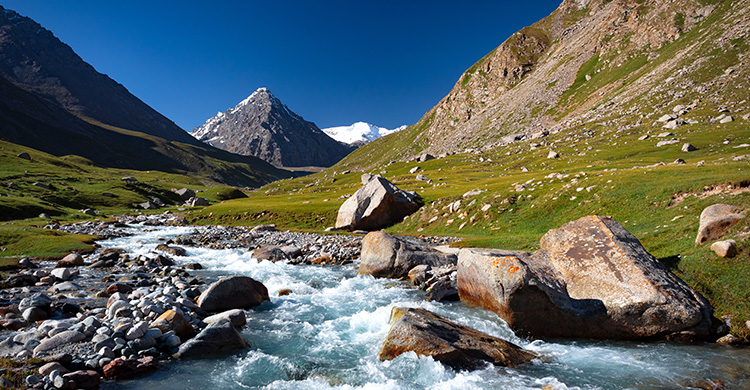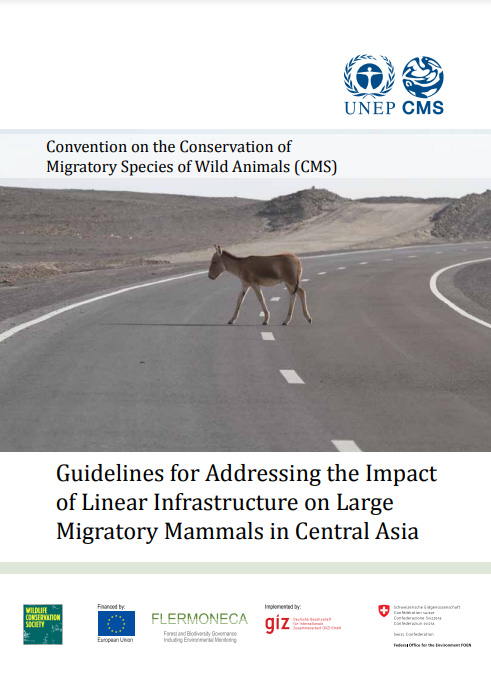A New Project to Reduce Impacts of Climate Change on Local Communities and Wildlife in Central Asian Mountains

Central Asian mammal species are highly affected by climate change.
Contributed article by Azamat Isakov, Conservation Consultant with UNEP and Polina Orlinskiy, CMS Secretariat.
Bonn, 4 December 2022 - Climate change is happening much faster than scientists predicted less than a decade ago, according to the latest report from a United Nations climate panel. Global warming has already resulted in higher incidences of extreme weather events, intense glacier melting and more frequent avalanches, floods, landslides and mudflows in Central Asian mountains. These changes affected both the local people and wildlife, requiring the development of adaptation measures to enhance resilience of human societies and the nature conservation sector. Die-offs of mountain ungulates due to extreme weather conditions have been reported by national NGOs. It has also been observed that pastoralists have increased their use of pastures at higher elevations probably in response to more frequent draughts and heat waves in lowlands affecting the vegetation there. Livestock grazing at higher elevations and thus closer to wildlife range, can cause an increased competition for resources between wildlife and livestock, and more frequent attacks of wild carnivores on livestock, resulting in more human-wildlife conflicts.
The project “Enhancing the conservation of flagship migratory mammal species of Central Asia through climate change-informed management and decision making”, funded by the German International Climate Initiative aims to strengthen resilience of local communities and flagship species in Central Asian mountains to climate change impacts and other related drivers. It was launched through an online webinar at the regional level in April 2022. The project, also known under the short title “Central Asian mammals and climate adaptation” (or CAMCA), is implemented by UNEP in close collaboration with the Secretariat of the Convention on Migratory Species of Wild Animals (CMS) within the CMS’ Central Asian Mammals Initiative and other international and local project partners in three Central Asian countries (Kyrgyzstan, Kazakhstan and Tajikistan).
CAMCA project team works on Ecosystem Based Adaptation solutions and aims to contribute to long-term conservation and protection of wild mountain mammals and their habitats, while strengthening livelihoods of local communities and improving the knowledge base of decision-makers to address the impacts of climate change.
Following the regional kick-off workshop, national consultation meetings were held in the project countries, during which the target species and pilot areas in each country were determined. In Kazakhstan stakeholders agreed to select the Argali, Snow Leopard and Bukhara Deer as primary target species. Asiatic Ibex and Tien Shan Bear were mentioned as secondary target species (co-benefiting from interventions aimed at primary target species). The pilot sites selected were: Ili-Balkhash Nature reserve and the Zhongar Alatau National Park. In the Kyrgyz Republic stakeholders agreed to select the Argali, Ibex and Tien Shan Maral as primary target species. Snow leopard and Tien Shan Bear were mentioned as secondary target species and as pilot sites Naryn State Reserve and Khan-Tengiri Nature Park, with special consideration given to the mountainous corridor connecting the two areas.
In Tajikistan Bukhara Deer, Snow Leopard and Asiatic Ibex were confirmed as primary target species, with secondary target species Tien Shan Bear and Argali. The Tigrovaya Balka Nature Reserve and the area of the Vanj valley within the Tajik National Park, were selected as pilot sites.
The meetings were organized by UNEP in cooperation with CMS Secretariat, GRID-Arendal, Regional Mountain Centre of Central Asia, WWF Russia, Association for the Conservation of Biodiversity of Kazakhstan, PF CAMP Alatoo, PF Ilbirs, PF CAMP Tabiat and Association of Nature Conservation Organizations of Tajikistan. The participants included representatives the Governments of Kazakhstan, Kyrgyzstan and Tajikistan; Academies of of Science of Kazakhstan, Kazakhstan and Tajikistan, NGOs, other national and international agencies and independent experts.
More information can be found at the website of the project “Enhancing the conservation of flagship migratory mammal species of Central Asia through climate change-informed management and decision making”.
Last updated on 05 January 2023




